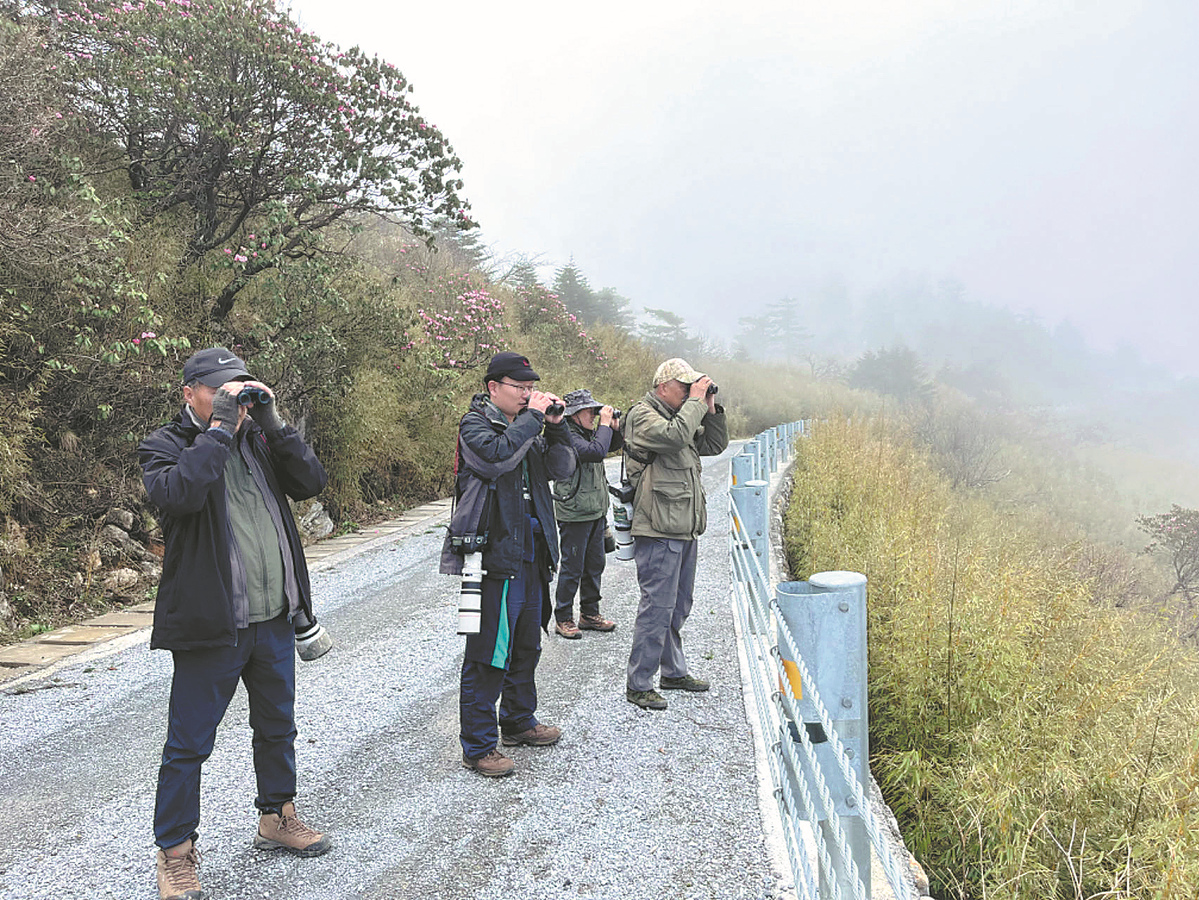Lei Jinyu(second from left)and three bird-watchers participate in a bird survey in Shennongjia, Hubei province, last year. CHEN LIANG/China Daily
Bird-watching has emerged as a rapidly growing hobby in China, as is made evident from the multitude of people seen watching and photographing birds in parks in major cities.
Just how many keen birders there are in the country was answered at the closing ceremony of the 2024 Beidaihe International Bird-watching Festival held in Qinhuangdao city, Hebei province, on Sunday.
According to the report 2023 Census on Bird-watching Enthusiasts and Bird-watching Organizations on the Chinese Mainland released at the event, the number of bird-watching enthusiasts on the Chinese mainland has been rapidly increasing, reaching 340, 000 people, a significant growth compared to the previous survey conducted in 2018, which reported 140, 000 bird-watchers.
Bird-watching organizations have also seen rapid development, spreading across 28 provincial-level administrative regions, with 30 percent of them established after 2018.
"Over the past 30 years, birdwatchers have evolved from being almost non-existent on the mainland to becoming an important force in the observation, monitoring and conservation of natural ecosystems in the country, "said Lei Jinyu, general-secretary of the Rosefinch Center, a nonprofit organization dedicated to promoting bird-watching and the conservation of birds. Founded in 2014, Lei said, the Rosefinch Center is a united action platform for Chinese bird-watching organizations and was involved in carrying out the survey.
The report emphasized that 66. 69 percent of bird-watching enthusiasts have participated in bird surveys organized by various organizations, actively promoting the concept of"watching birds well and protecting birds well", becoming an undeniable force driving bird and natural ecosystem conservation in China.
Various bird-watching organizations have engaged in numerous bird conservation and publicity events, many of which have submitted suggestions on bird and habitat conservation to governments at all levels, said Wu Minglu, secretary-general of the China Wildlife Conservation Association, a nonprofit organization dedicated to promoting the sustainable development of China's wildlife.
"With the continuous advancement of ecological civilization construction in recent years, government departments are increasingly valuing bird surveys, and publicity events on the conservation of birds conducted and participated in by the public, "Wu said. "Bird monitoring in various regions, synchronized surveys of cranes and other migratory waterbird populations and Bird-Loving Week promotions, all these activities involve active participation from bird-watching organizations. "
The census is one of the initiatives under the United Nations Development Programme-Global Environment Facility, which among other things aims to strengthen the protected area network for migratory bird conservation along the East Asian-Australasian Flyway in China. It enables the mobilization of a broader range of civil institutions and individuals to participate in migratory bird conservation efforts.
According to Yu Xiubo, the project's chief technical adviser, compared to developed countries in Europe and North America with a bird-watching history of over a century, the number of bird-watching enthusiasts on the Chinese mainland, both in terms of population and percentage among the country's total population, remains relatively low, "but it also means there is great development potential".
The survey also highlighted the unique regional and contemporary characteristics of bird-watching as a global recreational activity in the country, Lei said.
For example, the age structure of bird-watchers on the mainland differs from that of developed Western countries, with a predominance of middle-aged and young enthusiasts.
Despite the increasing popularity of self-driving travel, green travel remains an important choice for Chinese bird-watchers, Lei said. The internet and smartphones have played an important role in accessing bird information and uploading bird-watching records.
New technologies and big data have propelled the rapid development and progress of bird-watching as a way of citizen science, he said. The survey also identified natural education institutions as a new force in promoting bird-watching and bird conservation.
